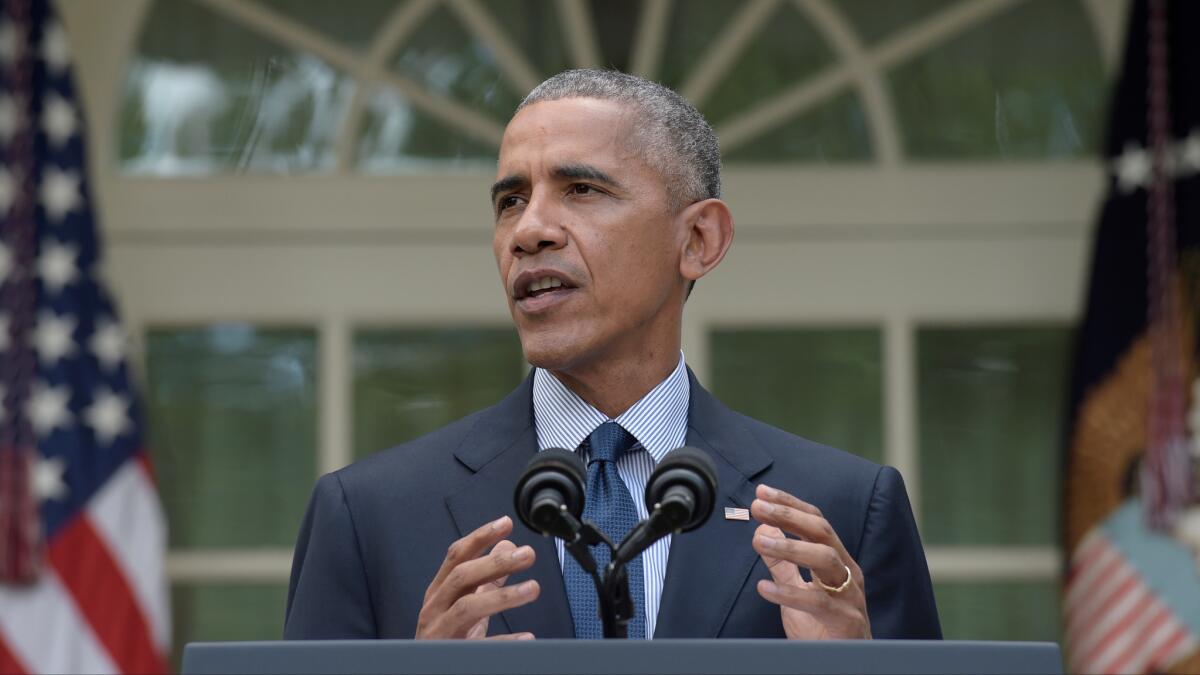Editorial: With the Paris Agreement ratified, the world needs to step up its fight against climate change

The Paris Agreement on global warming cleared an important hurdle Wednesday when several European countries added their ratifications, meaning that nations accounting for more than 55% of the world’s carbon emissions were formally on board — the level required for the pact to go into effect.
Reached in December, the agreement aims to keep the global average temperature from rising more than 2 degrees Celsius above pre-industrial levels — and ideally, to keep the increase under 1.5 degrees Celsius.
The swift ratification means the pact will go into effect much faster than many had thought — on Nov. 6, less than a year after the agreement was reached. The pace was propelled in no small part by international fears that a President Donald J. Trump would make good on his campaign promise to blow it all up.
Of course, Trump in the White House could hamstring U.S. efforts to throttle back its own emissions, but this step by foreign governments makes it much more difficult for him to carry out his pledge to re-negotiate a deal that was, in fact, reached by nearly 200 countries.
President Obama committed the U.S. to cut carbon emissions by 26% to 28% by 2025, but the agreement is nonbinding and Trump could renege. In fact, given Trump’s support for fossil fuel production in general and the coal industry in particular, a Trump administration likely would push emissions in the other direction.
Democratic presidential nominee Hillary Clinton has given her full-throated endorsement to the pact and the science behind it, which means people serious about combatting climate change have an easy decision to make come election day.
We’re already seeing the kinds of environmental changes that global-warming experts have warned about — rising seas, stressed flora and fauna, more intense weather swings — and some leading scientists think the world already may be too far down the warming path to hold the increase to 1.5 degrees Celsius. Last year was the warmest on record, and 2016 is on pace to match or exceed that as part of what experts fear is an acceleration in temperature rise.
The warming caused primarily by burning fossil fuels has been a long time building, and it will take time to achieve meaningful curbs — particularly given the indefensible political hurdles engendered by science-denying Republicans in Congress and state governments.
The U.S. Court of Appeals for the District of Columbia Circuit last month heard oral arguments in a lawsuit by 27 states and various industry groups seeking to stop the Obama administration’s Clean Power Plan, which requires states to adopt plans to cut emissions from power-generating plants. It’s unclear when the court will rule, but the judges need to work quickly.
President Obama could be right in saying history may judge the ratification of the Paris Agreement as “a turning point for our planet.” But if meaningful reductions in carbon emissions don’t follow, then history will judge this as the moment when the world acknowledged it had a problem, yet failed to fix it. The longer the world — and governments — dillydally, the more likely future generations will regard us as fools.
Follow the Opinion section on Twitter @latimesopinion or Facebook
More to Read
A cure for the common opinion
Get thought-provoking perspectives with our weekly newsletter.
You may occasionally receive promotional content from the Los Angeles Times.










